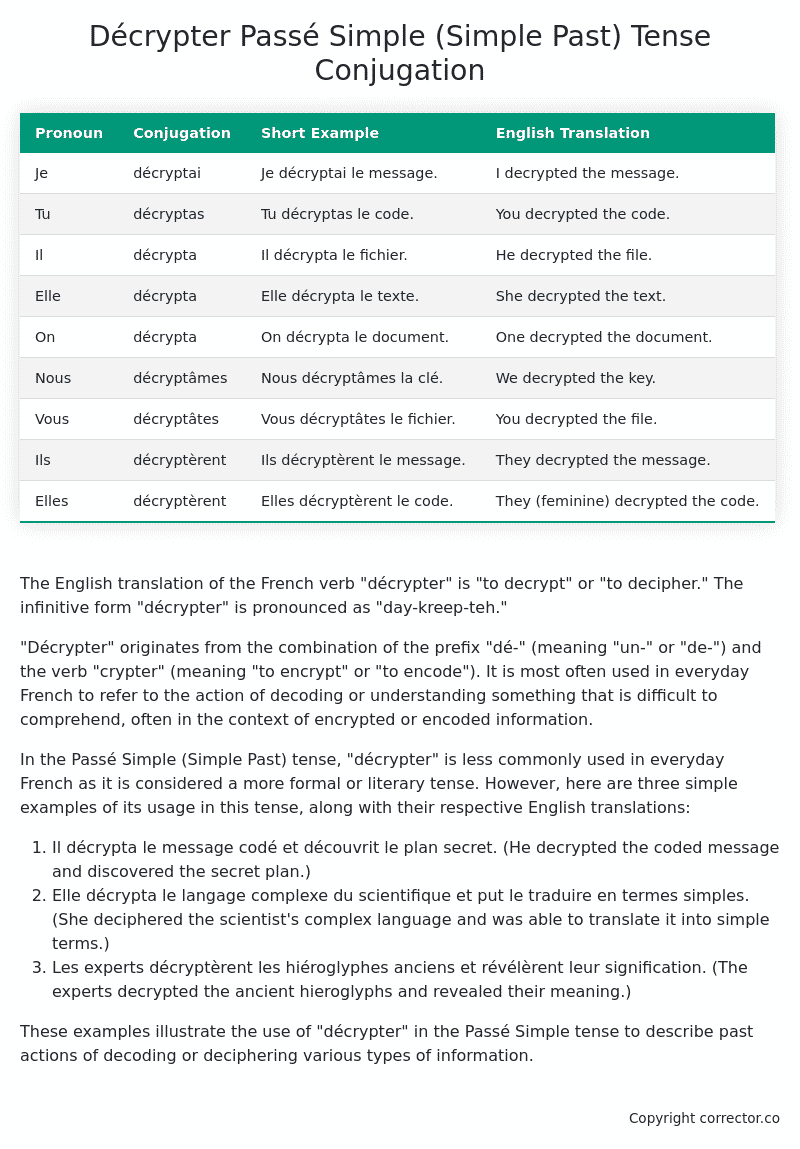Passé Simple (Simple Past) Tense Conjugation of the French Verb décrypter
Introduction to the verb décrypter
The English translation of the French verb “décrypter” is “to decrypt” or “to decipher.” The infinitive form “décrypter” is pronounced as “day-kreep-teh.”
“Décrypter” originates from the combination of the prefix “dé-” (meaning “un-” or “de-“) and the verb “crypter” (meaning “to encrypt” or “to encode”). It is most often used in everyday French to refer to the action of decoding or understanding something that is difficult to comprehend, often in the context of encrypted or encoded information.
In the Passé Simple (Simple Past) tense, “décrypter” is less commonly used in everyday French as it is considered a more formal or literary tense. However, here are three simple examples of its usage in this tense, along with their respective English translations:
- Il décrypta le message codé et découvrit le plan secret. (He decrypted the coded message and discovered the secret plan.)
- Elle décrypta le langage complexe du scientifique et put le traduire en termes simples. (She deciphered the scientist’s complex language and was able to translate it into simple terms.)
- Les experts décryptèrent les hiéroglyphes anciens et révélèrent leur signification. (The experts decrypted the ancient hieroglyphs and revealed their meaning.)
These examples illustrate the use of “décrypter” in the Passé Simple tense to describe past actions of decoding or deciphering various types of information.
Table of the Passé Simple (Simple Past) Tense Conjugation of décrypter
| Pronoun | Conjugation | Short Example | English Translation |
|---|---|---|---|
| Je | décryptai | Je décryptai le message. | I decrypted the message. |
| Tu | décryptas | Tu décryptas le code. | You decrypted the code. |
| Il | décrypta | Il décrypta le fichier. | He decrypted the file. |
| Elle | décrypta | Elle décrypta le texte. | She decrypted the text. |
| On | décrypta | On décrypta le document. | One decrypted the document. |
| Nous | décryptâmes | Nous décryptâmes la clé. | We decrypted the key. |
| Vous | décryptâtes | Vous décryptâtes le fichier. | You decrypted the file. |
| Ils | décryptèrent | Ils décryptèrent le message. | They decrypted the message. |
| Elles | décryptèrent | Elles décryptèrent le code. | They (feminine) decrypted the code. |
Other Conjugations for Décrypter.
Le Present (Present Tense) Conjugation of the French Verb décrypter
Imparfait (Imperfect) Tense Conjugation of the French Verb décrypter
Passé Simple (Simple Past) Tense Conjugation of the French Verb décrypter (You’re reading it right now!)
Passé Composé (Present Perfect) Tense Conjugation of the French Verb décrypter
Futur Simple (Simple Future) Tense Conjugation of the French Verb décrypter
Futur Proche (Near Future) Tense Conjugation of the French Verb décrypter
Plus-que-parfait (Pluperfect) Tense Conjugation of the French Verb décrypter
Passé Antérieur (Past Anterior) Tense Conjugation of the French Verb décrypter
Futur Antérieur (Future Anterior) Tense Conjugation of the French Verb décrypter
Subjonctif Présent (Subjunctive Present) Tense Conjugation of the French Verb décrypter
Subjonctif Passé (Subjunctive Past) Tense Conjugation of the French Verb décrypter
Subjonctif Imparfait (Subjunctive Imperfect) Tense Conjugation of the French Verb décrypter
Subjonctif Plus-que-parfait (Subjunctive Pluperfect) Tense Conjugation of the French Verb décrypter
Conditionnel Présent (Conditional Present) Tense Conjugation of the French Verb décrypter
Conditionnel Passé (Conditional Past) Tense Conjugation of the French Verb décrypter
Conditionnel Passé II (Conditional Past II) Tense Conjugation of the French Verb décrypter
L’impératif Présent (Imperative Present) Tense Conjugation of the French Verb décrypter
L’impératif Passé (Imperative Past) Tense Conjugation of the French Verb décrypter
L’infinitif Présent (Infinitive Present) Tense Conjugation of the French Verb décrypter
L’infinitif Passé (Infinitive Past) Tense Conjugation of the French Verb décrypter
Le Participe Présent (Present Participle) Tense Conjugation of the French Verb décrypter
Le Participe Passé (Past Participle) Tense Conjugation of the French Verb décrypter
Struggling with French verbs or the language in general? Why not use our free French Grammar Checker – no registration required!
Get a FREE Download Study Sheet of this Conjugation 🔥
Simply right click the image below, click “save image” and get your free reference for the décrypter Passé Simple tense conjugation!

Décrypter – About the French Passé Simple (Simple Past) Tense
Formation
Usage
Narration
Historical Context
Interactions with other tenses
Passé Composé
Imparfait
Conditional and Subjunctive
Summary
I hope you enjoyed this article on the verb décrypter. Still in a learning mood? Check out another TOTALLY random French verb conjugation!


